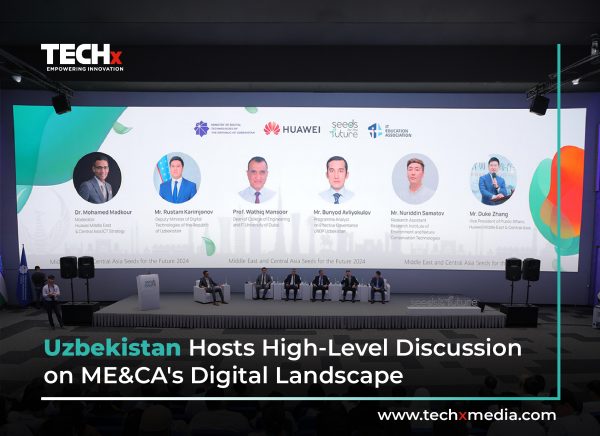
At the Huawei Seeds for the Future 2024 Regional Final, key ICT leaders from the government, private sector, and media convened to discuss the future of technology talent and its impact on digital economies. Held at the IT Park in the Ministry of Digital Technologies of the Republic of Uzbekistan, this influential event highlighted the role of ICT in driving digital transformation and sustainable growth in the Middle East and Central Asia (ME&CA) region.
The panel discussion, centered on the theme “ICT Talent & Youth Power Driving Digital Innovation & Shaping the Sustainable Future of the ME&CA Region: Public-Private Partnership & Open Collaboration for Shared Success,” emphasized the importance of public-private partnerships and open collaboration in nurturing ICT talent. The event featured prominent figures such as Karimjonov Rustam, Deputy Minister of Digital Technologies of Uzbekistan; Professor Wathiq Mansoor, Dean of the University of Dubai; Nuriddin Samatov, Research Assistant at the Research Institute of Environment and Nature Conservation Technologies; Bunyod Avliyokulov, Programme Analyst on Effective Governance, UNDP Uzbekistan; and Duke Zhang, Vice President of Public Affairs at Huawei Middle East & Central Asia.
Dr. Mohamed Madkour from Huawei ME&CA ICT Strategy moderated the discussion, highlighting how ICT serves as a foundational platform for enhancing learning, innovation, and regional economic prosperity. He underscored the crucial role of technology talent in advancing digital transformation across the ME&CA region.
Karimjonov Rustam emphasized the importance of integrating advanced technology into educational frameworks through strong public-private partnerships. He noted that nurturing local ICT talent is vital for preparing youth for future challenges and fostering innovation.
Professor Wathiq Mansoor stressed the need for bridging the gap between academia and industry through initiatives like Huawei’s Seeds for the Future (SFTF) program. He highlighted how such programs equip students with essential skills for thriving in a rapidly evolving digital landscape.
Nuriddin Samatov, a former SFTF participant, shared his positive experiences and stressed the importance of supporting similar programs to maintain a steady pipeline of skilled ICT professionals.
Bunyod Avliyokulov discussed the role of remote education in bridging the digital divide, particularly in rural areas with limited access to quality education. He emphasized the importance of collaborative efforts to ensure that all students have the opportunity to succeed in a connected world.
The panel also focused on Huawei’s contributions to digital education through smart campuses and advanced technologies like IoT, big data, AI, and cloud computing. The “Five Ones” smart education solution, which includes one screen, one network, one platform, one cloud, and one app, was showcased as a transformative approach to enhancing educational quality and efficiency.
Duke Zhang highlighted Huawei’s commitment to integrating cutting-edge technologies into educational systems to prepare future leaders and innovators. He emphasized the company’s dedication to smart education and digital inclusion, reflecting its impact across the ME&CA region.
The event facilitated engagement between media representatives and students from the ME&CA region, who participated in training workshops as part of Huawei’s Seeds for the Future initiative. Launched in 2008, this global program has positively impacted over 18,000 students from 141 countries, with collaborations involving more than 500 universities and colleges.